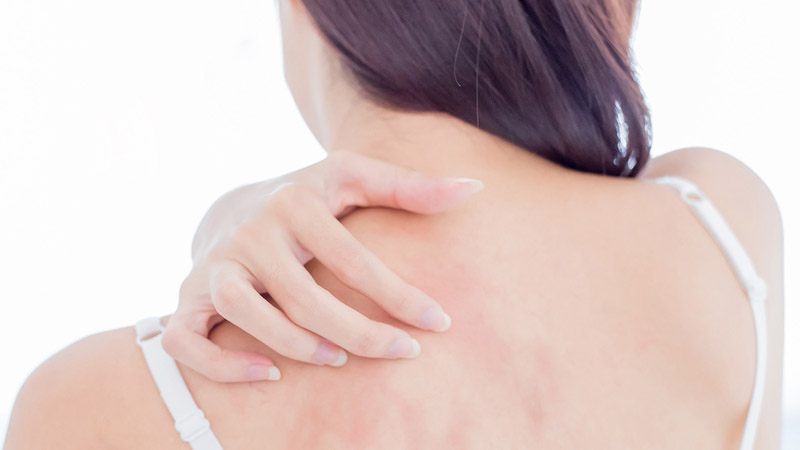Shoulder itch is a common and often frustrating condition that can be caused by a variety of factors. It can range from a mild, occasional itch to a persistent, debilitating itch that affects the quality of life.
Some common causes of shoulder itch include:
- Dry skin: Dry skin can cause itching on the shoulders and other areas of the body. This can be caused by cold weather, low humidity, hot showers or baths, and using harsh soaps or detergents.
- Eczema: Eczema, also known as atopic dermatitis, is a chronic skin condition that causes itching, redness, and dry, scaly skin. It can affect the shoulders and other areas of the body.
- Psoriasis: Psoriasis is a chronic skin condition that causes red, scaly patches on the skin. It can affect the shoulders and other areas of the body.
- Allergic reactions: Allergic reactions to products such as laundry detergents, fabric softeners, or lotions can cause itching on the shoulders.
- Infections: Fungal or bacterial infections, such as ringworm or impetigo, can cause itching on the shoulders.
- Parasites: Scabies, lice, and other parasites can cause itching on the shoulders.
- Stress: Stress can cause itching on the shoulders as well as other areas of the body.
- Medications: Some medications can cause itching as a side effect.
To treat shoulder itch, it is important to identify and address the underlying cause. For example, if dry skin is the cause, using a moisturizer and avoiding hot showers or baths can help. If eczema or psoriasis is the cause, a doctor may prescribe a medicated cream or ointment to help manage the symptoms. If an allergic reaction is a cause, avoiding the allergen can help. If an infection is caused, a doctor may prescribe an antibiotic or antifungal medication.
In addition to addressing the underlying cause, there are several things that can be done to help relieve shoulder itch. These include:
- Using over-the-counter anti-itch creams, such as hydrocortisone cream or calamine lotion.
- Taking an antihistamine, such as diphenhydramine (Benadryl) or loratadine (Claritin), helps relieve itching.
- Using a cool compress, such as a cold washcloth or a bag of frozen peas, helps relieve itching.
- Practicing stress-relieving techniques, such as yoga, meditation, or deep breathing.
It’s also important to practice good hygiene and to keep the skin clean and dry. Avoiding scratching the itchy area can help prevent further irritation and infection.
It is important to see a doctor if the itch is accompanied by other symptoms, such as a rash, fever, or swollen lymph nodes, or if the itch is severe and does not improve with self-care measures. The doctor may refer you to a dermatologist for further evaluation if necessary.
In conclusion, shoulder itch can be caused by a variety of factors, including dry skin, eczema, psoriasis, allergic reactions, infections, parasites, stress, and medications. To relieve shoulder itch, it’s important to address the underlying cause and to use over-the-counter anti-itch creams, antihistamines, and cool compresses. It’s also important to practice good hygiene and avoid scratching the itchy area. If the itch is severe or accompanied by other symptoms, it is important to see a doctor for an evaluation.


